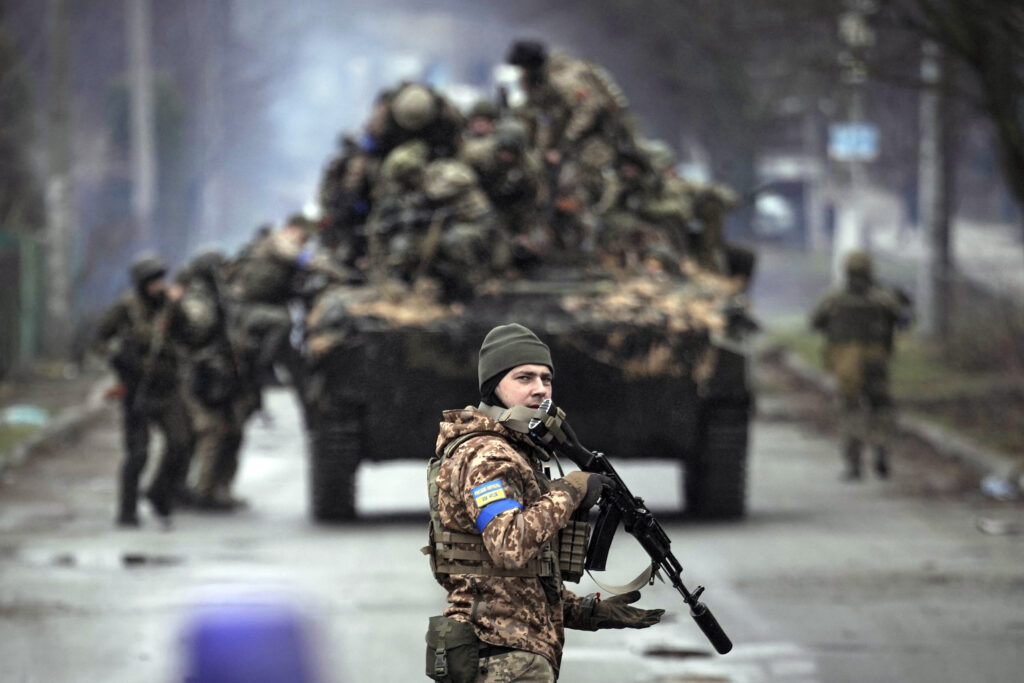
Retired Army Lt. Gen. Ben Hodges is among the many former U.S. military commanders who fault President Joe Biden’s administration for giving Ukraine only enough military support to keep it from losing, but not enough to win. Hodges, now retired and living in Germany, where he was once based, is a former commanding general of the U.S. Army in Europe and also a former head of NATO’s Allied Land Command in Turkey. The Washington Examiner’s Jamie McIntyre caught up with Hodges when he was in New York on a recent visit. The interview has been lightly edited for clarity.
Washington Examiner: General, you were one of the people early on who believed that Ukraine could win this war despite Russia’s numerical and technological superiority on paper. How would you assess where things stand as we enter year three?
Hodges: I absolutely believe that winning is still a possibility, and I would add that it’s essential that Ukraine wins this war for our strategic interest. Anybody who’s cracked open a history book knows that Russia will not stop just because of some negotiated settlement where they get to keep Crimea. So I think that the key is the United States and Germany declaring that it is our policy and in our strategic interest that Ukraine wins, that they defeat Russia, and then that we do everything possible to make it so.

Washington Examiner: Now, at the time we’re having this conversation, at the very end of February, a kind of a gloom-and-doom narrative seems to be taking hold. Russia’s making some small gains on the ground, Russian President Vladimir Putin seems to think the tide has turned in his favor, support in the U.S. Congress is weakening.
Hodges: Well, you’re right. There is this sort of defeatist tone out there. I heard it when I was in Munich just two weeks ago during the Munich Security Conference. But the tone is not based on actual facts on the ground. And if the United States and Germany, in particular, and others would provide everything that we said we would provide, there would not be this tone.
Russia, after 10 years of war — remember this started in 2014 — they still control only about 20% of Ukraine. Their air force and navy are not capable of performing their basic tasks, and over half a million Russian soldiers have been killed or wounded, not to mention the thousands of armored vehicles they’ve lost.
Washington Examiner: How significant are recent Russian advances, such as the fall of Avdiivka?
Hodges: People talked about Avdiivka like it was Stalingrad, but if you look on a map, Avdiivka is about as far in eastern Ukraine as you can get. If the Russians really had the ability to exploit these local tactical successes, I’d be very worried. But I’m not seeing that at this time.
If we don’t do anything and Ukraine continues to have to fight without the ammunition and capabilities that are needed, then we’re in a different situation.
But I actually see 2024 as the year of industrial competition, and that means the West and Ukraine both building up ammunition, maintenance, new systems, and Ukraine fixing their personnel system. If we get organized and serious about it, we can do that faster than Russia can do it. And if this year Ukraine can win that industrial competition, then we’re in an entirely different place next year.

Washington Examiner: What does Ukraine have to do in this coming year to turn the tide of battle back in its favor?
Hodges: No. 1 is make Crimea untenable for Russian forces. Make it so that its air force, the navy, logistics, army cannot operate from Crimea. Crimea is the decisive terrain of this war. I mean, if you look at a map, you can see that so long as Russia occupies Crimea, Ukraine will never really be able to rebuild its economy because occupied Crimea blocks access up into Azov Sea, where two of Ukraine’s former most important seaports, Mariupol and Berdyansk, are located.
And from Crimea, Russia is able to keep launching missiles and Shahed drones into pretty much anywhere into Ukraine. The Ukrainians have already proven the concept with just three British-provided Storm Shadow missiles. They have forced the Russian Black Sea Fleet to have to reposition out of Sevastopol to Novorossiysk, which is a Russian seaport further to the east on the Black Sea coast.
Washington Examiner: The United States and in particular Germany both have the kind of long-range weapons that Ukraine would need, if, for instance, it were going to try to take down the Kerch Bridge, that vital supply link from Russia to Crimea. Is the lack of those long-range weapons one reason Ukraine is on the back foot at the moment? [The 12-mile bridge Russia built over the Kerch Strait is the only direct link between the transport network of Russia and the Crimean Peninsula.]
Hodges: Yes. The long-range, precision weapons, of course, would give Ukraine the ability to destroy Russian headquarters, destroy Russian artillery, and destroy Russian logistics. Every square meter, every square meter of Russian-occupied Ukraine, including, of course, Crimea and all the Donbas and the famous Kerch Bridge, are within the range of the U.S, 300 kilometer-range ATACMS [Army Tactical Missile System] or German Taurus missiles. Imagine if they had 50 or 100 ATACMS or Taurus missiles, what Ukraine could do. Every headquarters, every artillery unit, every logistics site could be hit. Knocking out the Kerch Bridge will be part of that. And of course, that will take a lot of capabilities, but it’s all doable. And if anybody can do it, it’ll be the Ukrainians. That’s the capability that Ukraine needs, but for some reason, we continue to stall, or as [German Chancellor] Olaf Scholz even said, it’s “out of the question.”
Washington Examiner: Why do Biden and Scholz keep saying no? What are they afraid of?
Hodges: I don’t understand it, but I think this is linked to the fact that we, the West, have not clearly defined our objective: that we want Ukraine to win. And we continue to deter ourselves out of, I think, an unreasonable fear that Russia might do something that might escalate. Russian nuclear weapons are really most effective when they don’t use them because they see that we limit ourselves.
Washington Examiner: At the Munich Security Conference you attended, Sen. J.D. Vance (R-OH) argued that the $60 billion aid package that President Joe Biden has requested wouldn’t in his words “fundamentally change the reality on the battlefield.” And he went so far to suggest the U.S. doesn’t have the manufacturing capacity to keep supplying weapons and ammunition to Ukraine at the same rate it has over the last two years.
Hodges: He is embarrassingly strategically illiterate about those very topics. This is the United States. Of course we have the capacity to do that, as does Europe, but it always comes down to a matter of priorities. Defense industry is not a charity. They have thousands of employees. They depend on a sophisticated supply chain, so you have to put a priority on it. And obviously if you add together all the economies of Europe, separate from the U.S., of course, they have the capacity to do more — if it’s a priority.
Sen. Vance should know better, especially coming from a state like Ohio where we have industrial capacity. I mean, the Abrams tank is manufactured in Ohio, so he should have some better sense of what’s out there.
Washington Examiner: We expect by the summer to see F-16s joining the Ukrainian air force. Will that be the game-changer some people think it will be?
Hodges: I’m always reluctant to use the word “game-changer” because there is no one weapon system or platform that changes everything, at least not in a permanent, decisive way. But of course, Ukraine getting the capability that comes with large numbers of F-16s will help in neutralizing Russian air power, neutralizing Russian air missile strikes. They could also be employed to help make Crimea untenable. The concepts for employment will be very important. I don’t know how they’ll do it, but it’s not going to be that all of a sudden F-16s start showing up and magically things begin to blow up. And the Russians, of course, are looking for these F-16s and will be waiting for them.
Washington Examiner: Ukrainian President Volodymyr Zelensky says Ukraine suffered 31,000 combat deaths in the first two years of war, with many tens of thousands more wounded and out of action. He has replaced his top wartime commander, who must now find a way to replenish his front-line forces, which have an average age of 40, compared to the U.S. military where the average age of combat troops is somewhere between 18 and 23.
Hodges: Gen. [Oleksandr] Syrskyi is a proven commander. He’s tough and has battlefield experience, but he will need the government to fix the personnel system. There are 2 million Ukrainian men and women that are military age. [In Ukraine the age of conscription is 27, with some discussion of lowering it to 25.] Most of them are not anywhere near being in the armed forces inside Ukraine. Or else they’re in Germany, Poland, Romania, the Baltic countries. These are political decisions that the government has to make to make military service attractive and something that thousands of women and men will come to. Otherwise, Ukrainian armed forces — they’re going to be dangerously attrited over the coming year.
Washington Examiner: Zelensky seems very concerned that if Donald Trump wins in November, he’ll end military support for Ukraine. Is he right to fear a return of Trump?
Hodges: I think we should all fear a return of Trump. I do, mainly because he is so unpredictable and undisciplined and doesn’t demonstrate that he truly understands the importance of stability and security in Europe as a strategic interest of the United States. So yes, I can understand why President Zelensky would be concerned about what a Trump administration would mean for Ukraine.
At the end of the day, though, because Trump is such a transactional character, once he realizes or is convinced that it is in America’s interest that Europe is stable, secure, and prosperous, then perhaps he might be willing to do some things and not completely cut off support. Meanwhile, for the Europeans, the threat goes way up if the U.S. backs out, so they’re going to have to do more regardless.
CLICK HERE TO READ MORE FROM THE WASHINGTON EXAMINER
Washington Examiner: Is there reason for hope for Ukraine?
Hodges: Well, of course. Look, war is a test of will and it’s a test of logistics. The Ukrainians clearly have superior will over Russians. There are no Russians who want to go fight in Ukraine. That’s why Russia is having to do things like grab people out of prison or kidnap people and put them into armed forces. Nobody wants to do it. And of course, the Kremlin doesn’t care how many people they lose. So it does come down to a test of logistics. Can we get Ukraine what they need, and do we in Washington and Berlin have superior will to Vladimir Putin?





